Call for an expert on AI CybersecurityANEC is looking for an expert to provide us with technical expertise on cybersecurity, represent our organisation, and promote consumer interests in AI standardisation. The new ANEC expert will have the exciting opportunity to join the newly-established CEN–CENELEC/JTC 21 ‘Artificial Intelligence’ Working Group 5 ‘Joint standardisation on Cybersecurity for AI systems’, which has the initial scope of exploring ways and means to address cybersecurity standardisation-specific needs for AI systems. The work entails participation in meetings and providing expertise in terms of written comments, as well as advice to the ANEC Digital Society Working Group, ANEC CYBER Ad Hoc Group and ANEC Secretariat. ANEC will review applications on a rolling-basis. If you believe you could contribute to our work, please send an up-to-date CV and letter of motivation (in English) to This email address is being protected from spambots. You need JavaScript enabled to view it.. For more details, visit https://tinyurl.com/mryw7nfv Please note that additional expert funding could also be available under the StandICT project. The next StandICT Call for applications will close on 9 January 2024. The ANEC Secretariat is happy to assist the expert in the application process.
|
Lead story
On 30 November, ANEC President, Dermott Jewell – supported by ANEC Director-General, Stephen Russell – participated in the second meeting of the High-Level Forum on European Standardisation (HLFS). The meeting saw ANEC and other HLFS members sign a Pledge to confirm their willingness to take local actions aimed at promoting education and skills on standardisation.
Chaired by the Commissioner for the Internal Market, Thierry Breton, the Forum discussed key priorities for a more resilient, green and digital Single Market, before moving on to the interaction between international and European standardisation. Mr Jewell intervened to underline the continued weakness of the societal voice in ISO/IEC standardisation work, and reminded members not to overlook the European Standardisation System which remained able to deliver European standards with global currency. The text of his intervention can be found at https://tinyurl.com/3dcwjdaz.

Horizontal
On 1 December, the ANEC Steering Committee (ANEC/SC) met in Brussels for the 87th time, and the first of its 2023-2027 term.

ANEC President, Dermott Jewell, noted it was also the first meeting of a four-year term of the ANEC/SC (the Statutes 2022 having modified the term from two years). He said the change had been made to facilitate the role of the ANEC/SC – as the board of the association – in ensuring both strengthened governance and strategic implementation on behalf of the General Assembly. Given this background, the main item on the agenda was a brainstorming by members on the new and emerging challenges affecting consumers and consumer organisations since the adoption of the present ANEC Vision in 2020. These first concepts will be refined and reflected in an evaluation of the Vision, and its supporting action plan, no later than 2025.
German member of the ANEC General Assembly, Dr Werner Daum, spoke to the board of KAN (the German Commission for Occupational Health & Safety and Standardization) at its meeting in Stuttgart in November. Dr Daum made a comprehensive presentation on the work of ANEC, and drew commonalities between the work of ANEC in seeking consumer protection and that of KAN in wanting the protection of workers. The meeting followed a first meeting between the ANEC and KAN Secretariats in September. It was agreed KAN and ANEC should seek a deepened collaboration in pursuing their common interests.
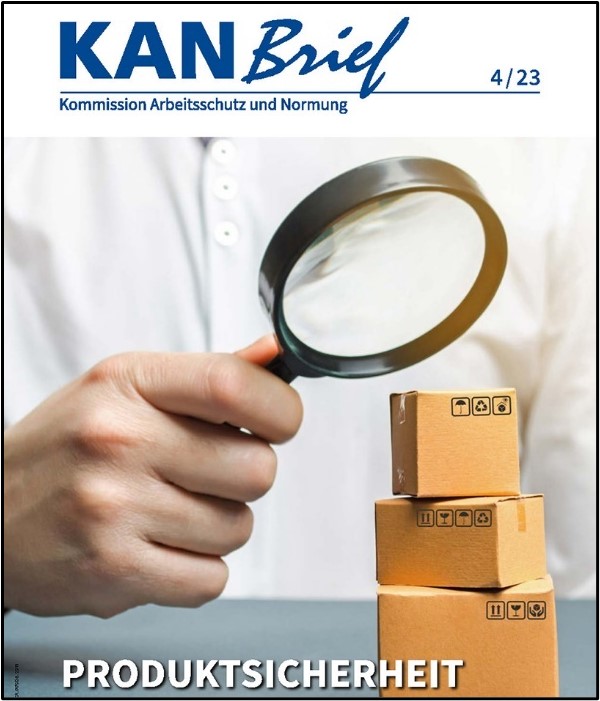
Meanwhile, ANEC Director-General, Stephen Russell, was interviewed for the 4/2023 edition of KANBrief, the KAN magazine on OHS and standardisation issues. He spoke about ANEC and its operation, before commenting on developments in the standardisation landscape both welcome and unwelcome. The English language version of the magazine can be found at https://tinyurl.com/4phmbn9w (French, German, Italian and Polish language versions are (or will soon be) available).
On 11 December, the European Commission (EC) announced the winners of the EU Product Safety Award 2023. The Award encourages and honours innovative business initiatives and research which enhance consumer safety beyond legal requirements. ANEC was honoured to be a member of the jury again, represented by Tania Vandenberghe.
The third edition of the Award invited submissions from SMEs and larger companies, as well as early-career and senior researchers. The competition for businesses focused on initiatives that enhance the safety of teenagers. Researchers from any discipline whose work contributes to improving product safety were also invited to apply.
Learn more about all the winners here: (http://tinyurl.com/ysazwv4h).

Six companies and four research teams were rewarded at the EU Product Safety Award ceremony for their outstanding contribution to consumer safety. The event was opened by Didier Reynders, Commissioner for Justice.
ANEC much appreciated the extension of the Award to researchers working on enhancing consumer product safety. The results of their research will underpin upcoming EU standardisation and legislative initiatives. We were also delighted to see that this year’s business initiatives also invest in the mental health and wellbeing of the young generation. We congratulate all the winners and trust the Award will inspire others to go the extra mile!
Also on 11 December, ANEC attended the 24th European Consumer Day, organised by the European Economic and Social Committee (EESC). This year's topic was ‘Consumers in the digital world: safeguarding youth and enforcing laws’.
As effective consumer protection needs to respond to the new realities of the digital age, the objective was to reflect on how to tackle the challenges, to find opportunities and to discuss what should be done to make consumer law enforcement more effective and efficient, bearing in mind the young generation.
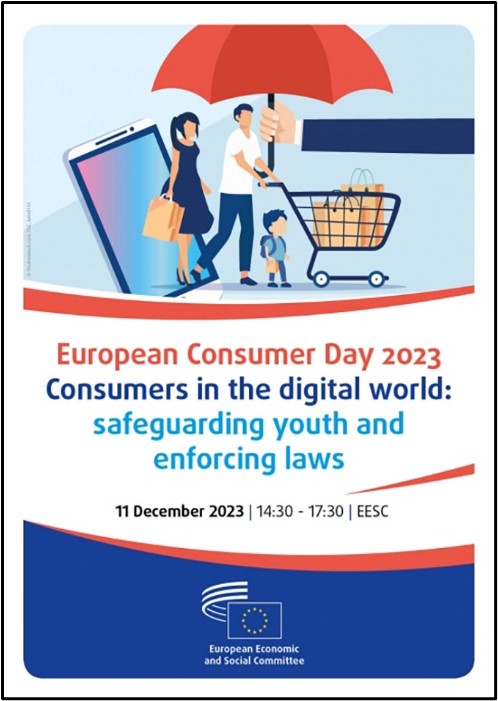
During the panel discussion, the EC identified the following challenges: basic consumer rights are still not met; increasing complexity of the digital market (lots of different legislations have to be applied at the same time) and very fast development of new business models.
BEUC underlined that, although 2023 is 30th anniversary of EU Single Market, there is a lack of a centralised enforcement structure in the Single Market; no concept of how the different enforcement authorities could work together and a lack of resources for enforcement. ANEC echoes the BEUC comments. The EC mentioned it is currently thinking of the development of the next consumer agenda and to include vulnerability of the young generation, as digital access is easy for children.
Accessibility
ANEC spoke at the Accessible EU networking event, ‘Building Community, Connecting Stakeholders’ hosted by the Fundación ONCE, in Madrid on 7 November. The aim of the event was to promote dialogue among industry, public administration and civil society representatives with the aim of improving accessibility.
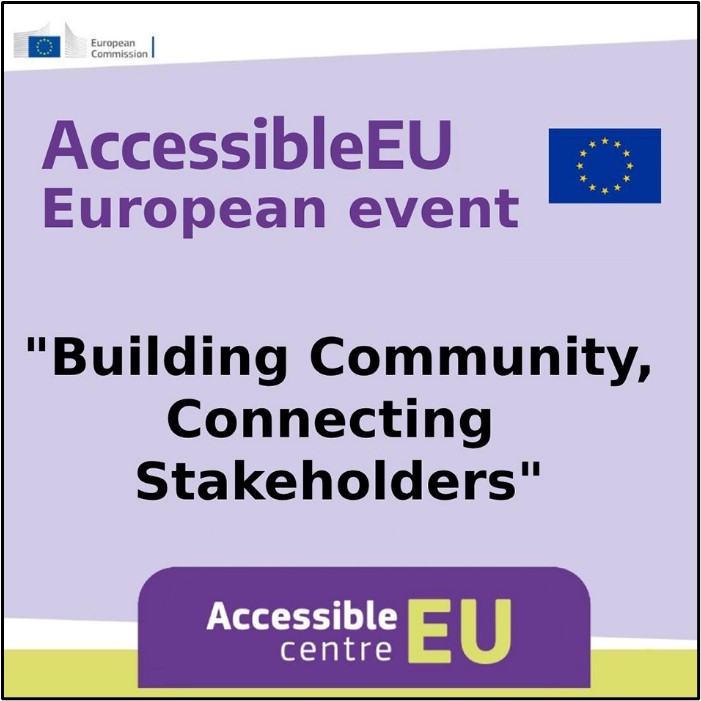
ANEC Deputy Director-General, Chiara Giovannini, spoke during a panel dedicated to civil society, focusing on the involvement of consumers in European and national standardisation. She presented the work of ANEC; spoke about how standardisation works in the EU policy process, reviewed how standards are used to support the European Accessibility Act, and concluded by summarising the best means to influence standards-making in the EAA and beyond.
Alberto Durán, Vice-President of the Group Social ONCE, opened the event by calling for “breaking barriers of all kinds and focusing on accessibility as an engine of change”. María Lledó, a minister from the Spanish government, said the Spanish Presidency of the EU was using “all its energy” so that the European Disability Card could be approved this year.
Child Safety
ANEC and TIE repeat Toy Safety Tips
Throughout November and December, ahead of Black Friday, Saint Nicholas and Christmas among other festivities, ANEC joined forces again with TIE (Toy Industries of Europe) in an online campaign to promote ten tips for buying safe toys (http://tinyurl.com/33j4yd7j).

A video forms part of a website dedicated to buying safe toys (https://toysafetytips.eu/).
The Toy Safety Tips are available in Dutch, English, French, Italian and Spanish (with more to follow).
Domestic Appliances
A seasonal reminder on the use of barbecues
Last year saw an increase in deaths from carbon monoxide (CO). Increasing energy poverty encouraged people to use cheaper but dangerous alternatives to traditional means of heating.

As accidents involving carbon monoxide are more frequent in colder months, ANEC returned to social media to remind consumers never to use a charcoal barbecue indoors because of the high risk of carbon monoxide poisoning (https://bit.ly/3ou0jp9).
Domestic Appliances & Services
EC call for evidence on cancer prevention
Under the Europe’s Beating Cancer Plan, adopted in February 2021, the EC announced its intention to study measures on exposure to ultraviolet radiation, including sunbeds. In that context, an EC call for evidence entitled ‘Prevention of cancer – reducing health risks from sunbeds’ ran until 19 November. (http://tinyurl.com/2awf7rma).

In the call, the EC proposes a Recommendation to ensure tangible progress in advancing the commitments to prevention in Europe’s Beating Cancer Plan. If the need arises, the EC will explore options beyond this Recommendation.
In our reply (http://tinyurl.com/4xuw2c7d), we agreed that the debate on sunbeds be brought to a higher political level, as we have long advocated. Rather than a European Recommendation, we urge the EC to propose European legislation that bans access to sunbeds for people under 18 years of age, and for people with skin type I. We also want providers of tanning facilities to be trained in order to have the required knowledge, and be able to give a professional consultation to customers (beyond the requirements of EN 16489 ‘Professional Indoor UV Exposure Services’).
In addition, we stressed the need for mandatory warnings to be affixed on sunbeds in a clearly visible and easily legible way, drawing attention of the user to the inherent health risks. We also called for strict requirements on advertising, and continued market surveillance actions on sunbeds.
In light of the various actions led by the EC for reducing human health risks associated with the use of sunbeds, DG SANTE held a webinar on 13 December, attended by ANEC. The webinar presented the evidence collected on the topics so far through a range of activities: a literature review; a survey of EU Member States and EFTA countries, and a call for evidence open to all interested parties. After the presentation, participants had the opportunity to express their views on the EC initiative.
Sustainability
On 22 November, the EP Plenary adopted its report (http://tinyurl.com/58fxtuup) on the Packaging & Packaging Waste Regulation, led by MEP Ries with 426 votes in favour, 125 against, and 74 abstentions.
Despite the success of the single-use lobby and fast-food corporations in removing restrictions on superfluous single-use packaging, several points ANEC supports (http://tinyurl.com/kuxh8uut) are still included in the report. Most importantly the EP agreement to ban intentionally-added PFAs and BPA in food packaging is a big win.

Moreover, according to the EP report, a delegated act will supplement this Regulation by establishing a minimum number of rotations for reusable packaging in specific packaging categories. Standards are envisaged to address design, labelling, cleaning and traceability of reusable packaging. Amendments on clearly understandable and accessible labelling for easier waste sorting, and on deposit return schemes, were maintained. The definition of compostable packaging is in accordance with the harmonised European standard, EN 13432.
Although MEPs have tended to focus on plastics in waste prevention targets (hence the risk of increasing paper packaging), they maintained the overall packaging waste reduction targets of 5% by 2030, 10% by 2035 and 15% by 2040.
You can find further details in the EP Press Release (http://tinyurl.com/mr3skkx5) and the adopted report (http://tinyurl.com/58fxtuup).
Council reaches position on PPWR
As this newsletter went to press, on 18 December, the Council reached its common position on the PPWR. We shall review the position Council decided to take in our next newsletter. Interinstitutional negotiations are expected to continue until spring 2024.

Ahead of the meeting, ANEC and its members called on national and European institutions to:
- support waste prevention targets to prevent unnecessary packaging - such as disposable tableware in HORECA, and fruits and vegetables packaging - where not required to protect the products.
- maintain ambitious reuse targets, at least those put forward in the EC proposal.
- maintain the EP’s proposals especially for:
- a ban of BPAs and 'forever chemicals' PFAS in packaging
- a delegated act to supplement this Regulation to establish minimum requirements for reusable packaging, supported by European standards.
- reject proposals to add exemptions and derogations from prevention and reuse measures.
On 7 December, the European Council and the Parliament reached a provisional deal on the recast of the Energy Performance of Buildings Directive (EPBD). The text aims to increase the ambition of energy performance requirements for new and renovated buildings in the EU and encourages Member States to renovate their building stock. While there will be room for ambition when transposing the Directive into national law, our colleagues in BEUC believe the present text leaves significant room for improvement (http://tinyurl.com/4tcfppkk).

In order to support the next steps, ANEC is promoting to policymakers the NextGenEPC cluster-level EPBD Recast policy recommendations (http://tinyurl.com/3fbtjep9). These can provide support, and aid with evidence, the transposition by Member States. ANEC is part of the EU-funded project SmartLivingEPC (http://tinyurl.com/4sxw7fjf), one of the projects within the NextGenEPC cluster - a network of 13 projects working towards improving EPCs to accelerate the much-needed deep-energy renovation of European buildings.
On 13 November, ANEC presented its views on how standards and labels can tackle greenwashing in the context of the proposed Green Claims Directive. ANEC Programme Manager, Michela Vuerich, shared a panel with representatives of DG Environment (ENV B.1), and the French Agency for Ecological Transition (ADEME).
Michela presented the ANEC position on reliable environmental claims (https://tinyurl.com/2p9fpb4v), referring especially to our proposals on how to improve the Green Claims Directive.
 Image courtesy of the EESC
Image courtesy of the EESC
She called for:
- a framework to identify right methods for relevant environmental aspects & common rules to substantiate, communicate, and verify green claims.
- further guidance on which conditions for which claims, specifying relevant indicators and benchmarks.
- the guidance in ISO 14021 (listing for each claim, qualifications and evaluation methodology) to be an inspiration, establishing binding rules in the Directive on green claims.
- verification based on relevant test procedures or other appropriate conformity assessment procedures.
- a work plan to specify what are (un)acceptable claims (similar to EU regulations on nutritional and health claims) and to define different kinds of claim.
A fruitful debate took place on the role of environmental standards and consumer behaviour, including with ANEC members and experts present as members of the EESC Consumers and Environment Category.
Chemicals
Further to its Regulatory Strategy on Flame Retardants from March 2023 (http://tinyurl.com/hzj6b4t5), the European Chemicals Agency (ECHA) announced the results of its investigation into additives present in plastic polyvinyl chloride (PVC), revealing potential risks to both human health and the environment. The report emphasised the need for regulatory action to minimise risks associated with plasticisers.
The EC will now assess ECHA's findings and determine whether a formal request for a REACH restriction proposal is required. For more, see the ECHA Press Release (http://tinyurl.com/ms2ptjz6).
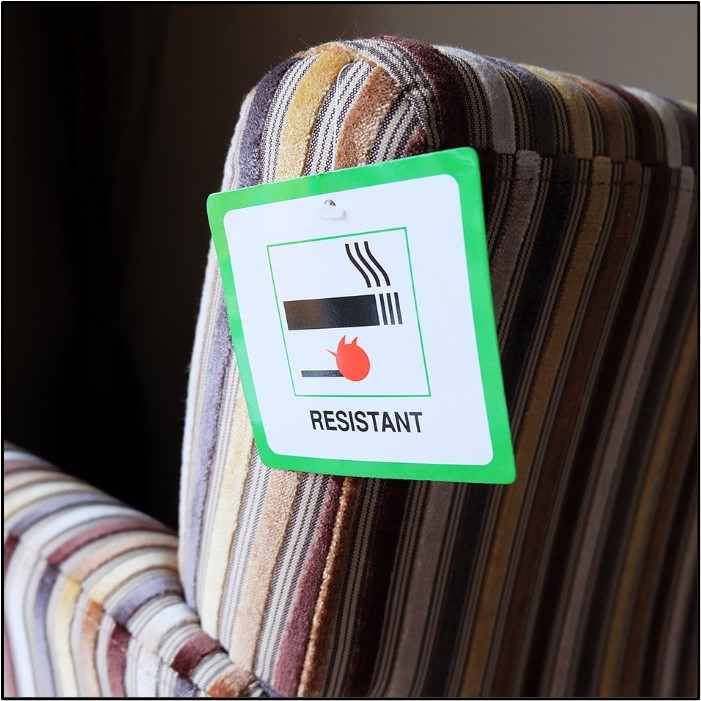
We welcome ECHA studying the potential hazards from flame retardants and PVC. In our longstanding call for an EU fire-safety strategy, we expressed a call (http://tinyurl.com/4xbdbex3) for a comprehensive discussion on how to avoid toxic flame retardants and find safer substitutes, especially where safety cannot be ensured otherwise (e.g. by using materials that are inherently fireproof).
Ecodesign
The European Parliament and Council have reached a provisional agreement on the Ecodesign for Sustainable Products Regulation (ESPR). The legislation aims to enhance the repairability and durability of products through design, and curb unsustainable practices such as the destruction of unsold textiles and footwear. Applicable to nearly all consumer goods, the ESPR will also address premature obsolescence and consumer information on product durability and repairability. Additionally, a digital product passport (DPP) will aid market surveillance and offer consumers information on sustainability aspects.
 (Image from Commission website)
(Image from Commission website)
Further details can be found in a press release from our BEUC colleagues (http://tinyurl.com/y3pbvcyc), and the earlier ANEC-BEUC position (http://tinyurl.com/bddrr9ee) and recommendations (http://tinyurl.com/bdfzc34d). More can be found in releases from the EP (http://tinyurl.com/4b75b8s3) and European Council (http://tinyurl.com/4atuv7cm).
Digital Society
Draft cybersecurity standards not approved
The following draft standards (prENs) from CEN-CENELEC/JTC 13 on cybersecurity-related aspects of consumer products have not been approved, in line with ANEC’s position:
- prEN 18031-1 ‘Common security requirements for radio equipment - Part 1: Internet connected radio equipment’
- prEN 18031-2 ‘Common security requirements for radio equipment - Part 2: radio equipment processing data, namely Internet connected radio equipment, childcare radio equipment, toys radio equipment and wearable radio equipment’
- prEN 18031-3 ‘Common security requirements for radio equipment - Part 3: Internet connected radio equipment processing virtual money or monetary value’.

As reported in our previous newsletter, ANEC did not support these first proposed Harmonised European Standards on cybersecurity due to what we saw as a lack of risk assessment, inconsistent requirements and lack of reproducible tests. These flaws make them unsuitable to protect consumer security.
A second Enquiry is likely to take place upon redrafting of the proposed standards.
ANEC AI Expert, Pete Eisenegger, who represents the collective consumer interest in CEN-CENELEC/JTC 21, features in a new list of civil society experts compiled by the European AI & Society Fund (EASIF).

The list can be found on the EASIF website (http://tinyurl.com/yud83dh9) and contains profiles and contact information of respected policy experts, researchers and lawyers from the European civil society community. These are experts who can speak to the media and other stakeholders on issues such as AI regulation, facial recognition, racial justice, AI in health, border surveillance, algorithmic welfare distribution, conditions for workers training, and Chat-GPT.
ANEC at first global AI Safety Summit Fringe
On 1-2 November, the UK hosted the first global AI Safety Summit, bringing together leading AI nations, technology companies, researchers and civil society groups to accelerate action on the safe and responsible development of frontier AI around the world. The Bletchley Declaration (http://tinyurl.com/3za7c5u4), signed by countries attending the AI Safety Summit, was a first step towards an international agreement.
On 2 November, ANEC Deputy Director-General, Chiara Giovannini, was invited to speak at a panel event - hosted by the Queen Mary University of London, the Alan Turing Institute, the All-Party UK Parliamentary Group on AI and the Big Innovation Centre - dedicated to equity-driven perspectives on global AI governance.

Chiara recalled ANEC has repeatedly called for increased inclusiveness of the standardisation process in order for consumers of all ages and abilities – as well as other civil society stakeholders - to be able to participate effectively in the development of the standards. She added we had successfully lobbied to influence the content of the AI SReq and that (for the first time) the EC was asking CEN-CENELEC to take actions:
(a) to facilitate an appropriate representation and effective participation of the relevant stakeholders, including small and medium-sized enterprises and societal stakeholders, in accordance with Article 5 of Regulation (EU) No 1025/2012;
(b) to ensure that European standards and European standardisation deliverables are in conformity with Union law on fundamental rights and Union data protection law, in accordance with Annex II.
ANEC encourages CSOs to get active. . .
On 6 December, ANEC hosted the webinar, ‘How can civil society organisations get organised and active to influence AI standards at the national level?’ The webinar was supported by the European AI & Society Fund.
As AI Standards have been requested by the EC and are starting to be developed by CEN-CENELEC, now is the time for Civil Society Organisations (CSOs) to get involved in AI standardisation. Given European (and international) standardisation is founded on the national delegation principle for the most part, participation at the national level is influential. ANEC encouraged CSOs to be present and shape AI standards there.
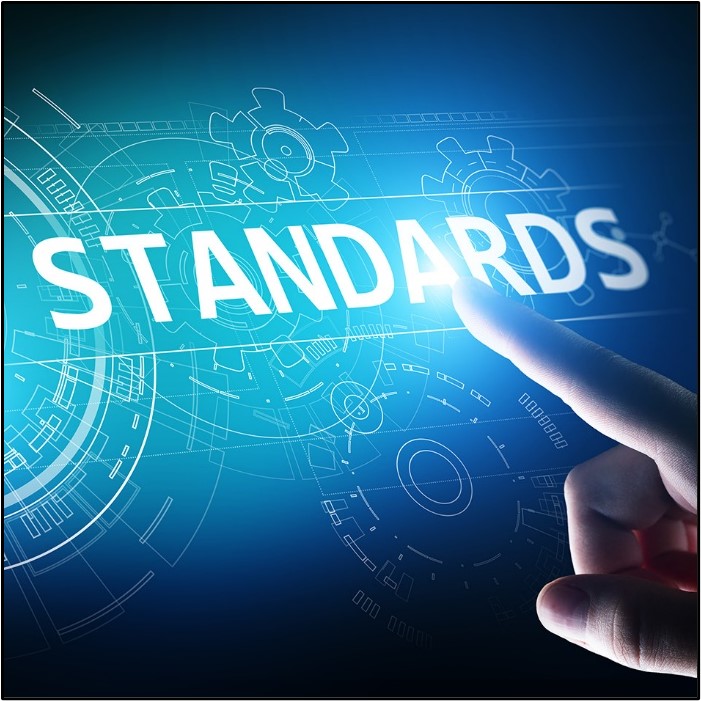
Participants heard a presentation from Chiara Giovannini, ANEC Deputy Director-General, about the five different CEN-CENELEC WGs on AI standardisation; work at international level, and the importance of being active at national level.
Dr Alexander Goschew, Project Manager at the DIN Consumer Council, gave the practical example of creating an AI expert group and getting involved in AI standardisation.
Participants also heard the experiences of Algorithm Audit's activity at the Dutch national level, shared by Jurriaan Parie, Algorithm Audit Board Member and Director.
An interactive Q&A session and guidance on identifying the skills, staff, support and time that could be useful for achieving results at national level concluded the webinar.
With a ballot having opened until 23 January 2024 on the preliminary New Work Item Proposal (NWIP) for a ‘Trustworthiness framework”, ANEC - active in the CEN–CENELEC JTC 21/WG1/ TG ‘Inclusiveness’ - urges CSOs to become active at national level as soon as possible by making contact with their national standardisation bodies.
CSOs can then express their support for the approval/rejection/abstention of the proposal and so influence the national voting positions.

The proposed standard will support the implementation of the EU AI Act and the AI Standardisation Request (SReq), complementing the specific standards providing presumption of conformity with the legal requirements.
Trustworthiness embraces all the key aspects of AI that are needed by European society. It includes addressing AI ethical issues in a practical way, as well as security, privacy, safety and inclusivity with a risk removal/mitigation-based approach throughout a product’s lifecycle. It should be noted, however, that more standards are needed on Trustworthiness requirements for civil society stakeholders, and it is hoped the present proposal for a Trustworthiness framework will be the basis for the development of other standards.
Services, Domestic Appliances
Calling for an EU Fire Safety Strategy
Ahead of the 2024 European elections, organisations representing consumers, fire experts and industries working on fire safety in the European Union, have launched a campaign calling for an EU Fire Safety Strategy.
Members of the European Parliament, candidates for election in 2024, and economic and social stakeholders are invited to endorse the manifesto ‘Keeping EU citizens fire safe in all buildings’. The Manifesto calls for the European institutions to prioritise fire safety in buildings, and develop and promote a consistent strategy within Member States for the fire safety of people in buildings, especially considering the unmitigated risks that exist at present, and new challenges posed by the European Green Deal's focus on decarbonising buildings. For more information on the campaign and to give your support, please visit www.keepeufiresafe.org

This campaign comes at a crucial time when nearly 450 million EU citizens, who spend 90% of their time in buildings, are poised to elect their representatives in the EP.
During the European Fire Safety Week (http://tinyurl.com/bu2usr3f), the High Level Roundtable on Fire Safety met at the European Parliament on 15 November 2023. Key policy makers and stakeholders debated what the EC and EP should do to improve fire safety in Europe, aiming at assessing the progress made on fire safety so far and calling upon the EP and EC to take further coordinated actions in their next mandates.
Key areas discussed were fire statistics; research needs and training; fire safety of the energy transition and renovation wave; EU Fire Information Exchange Platform (FIEP), and essential fire safety requirements for car parks.

At the event, MEP Seán Kelly announced that - with other Members of the European Parliament – he had secured the budget for a Preparatory Action on fire statistics as a follow-up to the EU FireStat pilot project (https://eufirestat-efectis.com).
On behalf of ANEC, Michela Vuerich intervened at the event stating consumers should benefit from common essential safety requirements across Europe, and welcoming the excellent news that the EP will continue the work on fire statistics. The follow up study will bring a European injury data base a step closer which we and other stakeholders want to include fire accidents. We raise attention to the importance of collecting and sharing reliable and up-to-date accident data in a consistent manner. Michela underlined the importance of encouraging the reporting of near misses. There was wide agreement on the these points in the room. ANEC looks forward to the next steps on the collection of European fire statistics.
ANEC fire safety expert, Alan Cox, has written a new article, “Can Artificial Intelligence (AI) be used in fire safety?”.

In his article, Alan analyses how AI holds advantages and pitfalls for the fire-safety community and general public, and provides his perspective on what to expect. You can find Alan’s article page 44 of the online December 2023 issue of International Fire Protection magazine (http://tinyurl.com/k6uyda6m).
Revisiting events during EU Fire Safety week 2023
Fire safety and subsidiarity: what role for the EU? An online panel discussion on 13 November debated how – despite the legislative competence for fire safety remaining at national level - the EU can play a coordinating role in facilitating data sharing, research, and the exchange of experiences to support Member States in areas such as tourism, energy, environment, health protection, and consumer protection.
A recording is available at http://tinyurl.com/2vywfzxd.
Electrical safety and deployment of heat pumps, photovoltaic panels and charging points in buildings. At the meeting held on 14 November, the EU institutions presented how REPowerEU, the Energy Performance of Buildings Directive (EPBD) and the Heat Pump Action Plan will boost deployment of electrification technologies, and discussed with fire safety experts how the EU can support Member States.
Fire Information Exchange Platform (FIEP) webinar The webinar was held on 16 November. It debated Energy vulnerability and fire risk; inclusive crowd dynamics; Research from the Netherlands on the fire safety of vulnerable persons; and the Simulation of the evacuation of vulnerable occupants evacuation from high-rise residential buildings. ANEC raised the question of children’s vulnerability and asked about possible active learning programmes for children. In the Netherlands, there are three so called “Risk Factory’s”. They focus on active learning and their most important target group are children”. One participant from the USA recalled success with the fire-safety training of children in schools.
Slides and recordings from the events are available on the webpage of the European Fire Safety Alliance (http://tinyurl.com/bu2usr3f).
Traffic & Mobility
ANEC Traffic and Mobility WG Chair honoured
Congratulations to our ANEC Traffic & Mobility WG Chair, Ronald Vroman (Consumentenbond), who was awarded 'Guest of Honor for Life' at the International Conference on the Protection of Children in Cars at its Langwieder meeting in November. This award recognises his contribution to the field throughout his career. Ronald gave a speech highlighting the achievements of ANEC during the past decades, as well as the challenges ahead as we continue to press for the improved safety of children in cars.
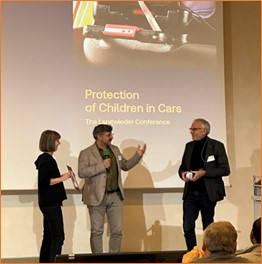

| List of meetings 2023 |
For comments or if you wish to write an article for the ANEC Newsletter, please contact: Helena CLARK (This email address is being protected from spambots. You need JavaScript enabled to view it.).



